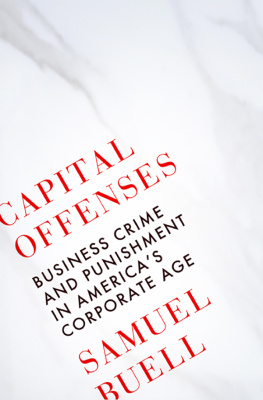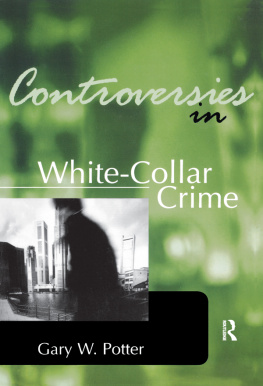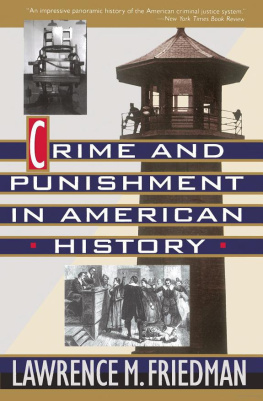
CAPITAL
OFFENSES
Business Crime and Punishment
in Americas Corporate Age
Samuel W. Buell

W. W. NORTON & COMPANY
Independent Publishers Since 1923
NEW YORK LONDON
For George and Janet
Corporation, n. An ingenious device for securing individual profit without individual responsibility.
AMBROSE BIERCE,
The Devils Dictionary (1911)
Candice Anderson of Van Zandt County, Texas, suffered a too common modern tragedy. At the age of twenty-one, on a clear November mid-morning outside Dallas, she lost her fianc Gene Erikson to a car crash.
The grief dealt to Candice that day was compounded several times over. Candice had been at the wheel when her new 2004 Saturn Ion left the road and smashed into a tree, seriously injuring her and killing Gene, who had been riding next to her in the front passenger seat. Then the state of Texas told Candice that she was to blame for Genes death. Prosecutors charged her with vehicular manslaughter and she was briefly jailed. Candice later agreed to plead guilty to manslaughter. A judge sentenced her to five years of probation, with hundreds of hours of required service. Candice was marked for life as the felon who killed Gene.
For ten years, Candice Anderson had to do the grueling work of accepting this as her and the states agreed version of Gene Eriksons death. Then, in 2014, though she thought she knew all there was to know about the crash, Candice learned that the story of that November morning that her prosecution and guilty plea had told was not true.
Texas police and prosecutors, like their colleagues across America, must make discretionary judgments about which of thousands of fatal car accidents each year will produce criminal charges. In Candices case, an officer thought Candice was acting erratically after the accident. (No wonder.) He arranged a blood test, which showed that Candice had a low amount of Xanax in her body, a medication she had taken the night before. (Research does not establish that this medicine, at ordinary levels, impairs driving without ingestion of other intoxicants.) There were no skid marks at the scene, where driving conditions had been excellent that day. Therefore, the state concluded, Candices intoxication caused the accident that killed Gene.
The truth was that Candices car killed Gene. Not only at the moment of impact but in nearly all respects. General Motors had manufactured the 2004 Ion with a mechanical starter that engineers at the company designed to be cheap. The starter was prone to malfunction. A drivers leg knocking the key chain in the ignition could cause the starter to rotate out of the run position, which meant, for this design of car, deactivation of power steering, power brakes, andmost importantlyairbags.
Candice lost control of the car and Gene did not survive the crash because General Motors sold her a car with a dangerously bad part. Ten years after the accident, once the truth about the car was revealed, the state of Texas corrected its understanding of Genes death and expunged Candices criminal conviction. Candice could now start another process of healing.
It seems we should say that General Motors killed Gene Erikson. Its perfectly sensible to summarize things that way. But what happens if we try to take a next logical step and say that, to correct matters fully, the government should replace the prosecution of Candice for homicide with a homicide prosecution of GM? GM is a corporation. It doesnt think, it cant drive a car, and it cant even really be seen. Its an amalgam of people, factories, vehicles, images, and offices spread across the globe. GM is an idea as much as it is a thing.
Under American law, a corporation such as GM can be prosecuted. But pursuing this remedy for the crash of that Saturn Ion would raise a host of difficult, not to say interesting, questions that nobody needed to wrestle with in an ordinary criminal prosecution like the State of Texas versus Candice Anderson.
Replacing Candice with GM is replacing apples with oranges, not a small apple with a larger one. Moving from prosecution of the corporation to prosecution of its managers and employees, it turns out, does not clarify the problem of corporate responsibility for Gene Eriksons death. Everyone in a position of senior management responsibility at GM appears to have been ignorant of the engineering decisions involved in that starter switchmuch less of any connection between those decisions and what ended up to be a total of over one hundred road deaths.
Even lower-level employees handling lawsuits against the company for some of the related crashes failed, for nearly nine years, to connect the accidents to the starter switch and raise the alarm with their supervisors about a systemic problem. The engineer who designed the bad switch understood, at some point, his mistake. But, even as he corrected the switch design, he covered up his error.
GM is responsible, but who within GM could be prosecuted in this fiasco, and for what crimes? There is no crime in American law of managing a corporation badly, no matter how serious the harm that results. Under regulations governing the auto industry, there isnt even a crime of manufacturing an unsafe starter switch. Maybe the engineer should be charged with killing Gene. But, as he toiled within the bowels of GM, did he realize his neglect might endanger lives?
Suppose he did. Would a prosecution of this midlevel salaried worker, even for homicide, really be a way of saying GM killed Gene and punishing the company for that? It seems as though GMs managers, with their cost-cutting strategies and their failure to make sure the left hand in the company knew what the right was doing, are most responsible as a matter of factwhether or not by the letter of the law.
Even if the problem of the crime could be worked outwho committed it and what law he or she violatedwhat about the question of punishment? GM cant be put in a prison, so its not clear what a prosecution of GM could add to the civil lawsuits for each of the driver deaths that the company will have to settle with the survivors, no doubt at steep cost. Criminal fines could increase GMs total bill for its transgressions. But how big a fine would it take to get the GMs of the world not to make these kinds of mistakes again? Would such a penalty be so large that it could put GM in dire straits, eliminating those manufacturing jobs that the government tried so hard to save when it rescued the huge auto company from the financial crisis of 2008 to 2009?
A court could place GM, like Candice Anderson, on probation. But what does that mean for a corporation? It cant physically report to the probation office, it cant be made to pee into a cup, and its required community service would amount to writing another check (this one to charity, I suppose). Indeed, if GM were convicted of a felony, how could the company possibly feel anything like the stigma and remorse that Candice lived with for a decade?
Could the government round up GMs senior managers and imprison them for their serious business failures? Not in the American legal system, which strictly prohibits prosecuting a person without a clear law on the books at the time of his offensive conduct. There is no crime of bad management of a big company, not to mention no good argument for legislating such a sweeping and amorphous power to revoke liberty. The only conceivable criminal case against managers, even in theory, would be a prosecution for negligent homicide based on the long and attenuated chain running from their unawareness at GMs headquarters all the way down to the road outside Dallas that morning in November 2004.
Next page






